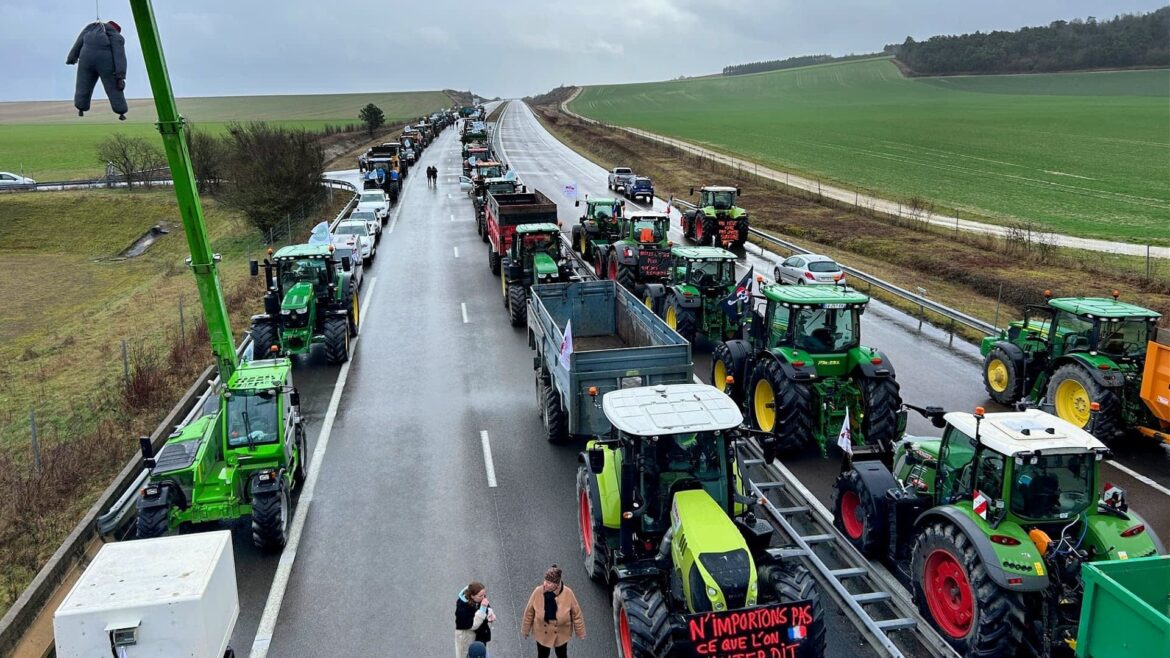Summary
Farmers across Europe protested high taxes, fuel prices, and delays in subsidy payments, with demonstrations blocking roads in France, Germany, and Belgium. French President Macron questioned the E.U.‘s free-trade agreement with Mercosur, while the commission proposed easing green farming requirements to alleviate pressure on farmers.
Motorways were blocked in France, and columns of tractors occupied the center of the German capital, Berlin, for several days. Key roads were cut off in Brussels, the heart and administrative center of the European Union, as thousands of farmers protested across Europe.
High taxes, high fuel prices, delays in subsidy payments and the effects of the Russo-Ukrainian War are at the epicenter of the farmers’ demonstrations.
However, according to Arnaud Rousseau, head of the French FNSEA farmers’ union, overregulation and the “incomprehensible” E.U. policies on farming are the underlying cause of the farmers’ protests.
See Also:E.U. Chief Promises Strategic Dialogue with Farmers
Rousseau also asserted that the bloc’s Farm to Fork strategy for food sustainability hinders European agricultural economic growth by heavily burdening its farmers.
In the wake of the farmers’ demonstrations in France, the most significant agricultural producer in the E.U., Prime Minister Gabriel Attal, said that the country will seek exemption from some rules of the Common Agricultural Policy (CAP) to suit the needs of its farmers better.
In addition, French President Emmanuel Macron questioned the bloc’s free-trade agreement with the Mercosur group of countries, claiming that the imported food products from the South American countries would fall short of the European food production and environmental standards.
Macron, nonetheless, supported the E.U. policies on agriculture, stating that they are not the reason for farmers’ problems.
In Germany, the phasing out of a tax reduction in agricultural diesel fuel sparked demonstrations by farmers, who claimed that it could lead them to bankruptcy and asked the government for financial backing.
However, the country’s finance minister, Christian Lindner, dismissed their request, citing limitations in the country’s budget.
In Romania, farmers have been protesting the elevated fuel costs, high insurance rates and cheap agricultural imports from Ukraine.
Polish farmers also demonstrated against competition from Ukraine, arguing that Europe should refrain from importing agricultural products from the war-torn eastern European country.
See Also:Farms Facing Natural Constraints Play Key Role in European Agriculture
“Ukrainian grain should go where it belongs, to the Asian or African markets, not to Europe,” said Adrian Wawrzyniak, a Polish farmers’ trade union spokesperson.
Protests are also spreading to southern Europe, with farmers in Greece setting up the first blockades on significant highways and their counterparts in Spain preparing to voice their discontent about high production costs and tight environmental regulations.
To appease protesting farmers across the E.U., the commission has proposed lowering the green farming requirements contained in the Common Agricultural Policy (CAP) while keeping the payments to farmers unchanged.
“By taking this stabilizing action, we can help alleviate the pressure that we know our farmers are feeling to ensure that they can stay economically viable during these times of high uncertainty,” said commission executive vice-president Maroš Šefčovič.
The farmers’ demonstrations have come just months before the European Parliament elections in June, fueling concern among political leaders who fear that Europe’s far-right parties will receive significant support from the frustrated farmers across the continent.
While not on the agenda, farmers’ protests were expected to be discussed off-the-record at the European Union leaders’ summit in Brussels on February 1st.

